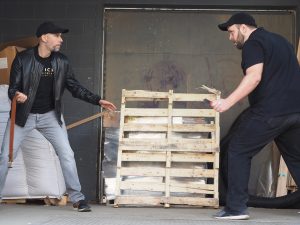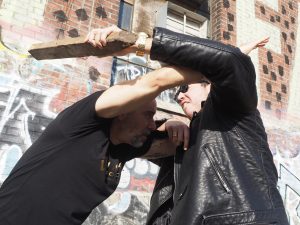A blunt force object inflicts injury by a brute strike or bashing. When learning self-defense, it’s just one item that you train to identify as an improvised weapon.
An improvised weapon is an everyday object used to save your life in an attack. It’s a spontaneous, makeshift creation of a weapon out of almost anything within reach not designed for protection.
Self-defense, after all, is about internalizing how to be adaptive and prepared. It is not common to walk around armed and ready for violence, so we must hone in on the alternatives. Therefore, learning how to transform random objects into self-defense weapons is always a critical aspect of your instruction in real-world protection.

Your counter strike must be harrowing, destructive, and potent, but for the most part, carrying a weapon is not merely impractical, but it’s often illegal. However, being unarmed shouldn’t leave you defenceless. It’s compelling to realize that there are a plethora of everyday items you may take with you anywhere that could potentially save your life.
What Are Some Improvised Weapons?
Your Belt:
Distance will always determine your self-defense technique and the efficiency of each weapon. Using a belt as an improvised weapon demands an open space to use it skillfully. Even amidst an attack, it is possible to remove your belt, immediately creating some range between you and the assailant. There are a few methods to create an improvised weapon using this personal item. Moving the belt around your body mimics a nunchaku, or long stick prevents close contact with your attacker. Wrapping the belt tightly around your hand gives you the self-defense opportunity to strike. Simultaneously, while maneuvering the belt, you can punch your attacker with your free hand or even kick.

Your Pen:
A pen is optimal for stabbing as well as puncturing vulnerable pressure points. This personal item may not be ideal as it requires being close to your attacker, but it could still wreak perilous havoc on him. In addition, it’s a powerful yet discreet weapon, which advantageously goes unnoticed in your hand.
Holding your pen in a closed fist, with the tip exposed and thumb placed on the opposite end for support, creates a singular improvised weapon. When held with an overhand grip, it’s imperative to aim for vulnerable body parts. They include:
- Eyes
- Throat
- Armpits
- Ribs
- Base of neck
- Groin
Self-defense instruction offers practical training on sensitive pressure points. For example, it reveals how a pen could inflict shocking pain on the neck, ribs, and upper arm muscles, following additional strikes and executing a takedown or joint lock to overcome a violent attacker.

Your Keys:
It is typical for anyone to be holding their keys in their hand, so speculation that you intend to use them as a fatal weapon is not highly probable. One method is to keep your keys deep within your fist, leaving only a bit outside your grip; this permits a stable hold if you gauge your attacker’s eyes.
Another position is still holding your keys enclosed in your fist but only keeping a single key protruding; between your closed pointer finger and thumb for stability. Again, this is not to mimic a blade-like weapon but grant you exceptional cutting ability.
You should use a slashing motion towards your attacker’s face, coupled with direct jabs into his vital areas (eyes, throat, and groin) to create a stinging and excessive pain. Damage inflicted on the eyes could create a temporary loss of vision, enabling you the freedom to escape.
Your Umbrella:
An umbrella is a tremendous improvised weapon allowing for self-defense at a distance, as a great reach is advantageous. However, it is always potent to target soft areas; the hardness and size of an umbrella favor you to strike anywhere on your attacker, to deter or slow them down. An umbrella, with its pointed end, could be the non-lethal dagger to help you escape a grim fate.
Your Flashlight:
A flashlight is a formidable, discrete weapon used to temporarily blind your attacker, break bones and even render him unconscious. In addition, as an improvised baton, the flashlight can generate profound blows to the temple, ribs, nose ridge, and chin.
Your Purse:
A purse could be a choice of improvised weapon as it could create distance between you and your attacker. It may not cause vigorous injury but could serve as a distraction and shield.
Although the inclination may be to beat your attacker with your purse, it’s best to lift it to shoulder level while holding on to the strap and swing it around you.
On the other hand, a briefcase is an optimal blunt object that can inflict intense pain by striking your attacker with it. A forceful swing indicative of a hook punch aimed at your attacker’s head, elbows, or knee joints should have the desired crippling effect you demand an escape.
Purses, briefcases, and even backpacks are all intelligent improvised weapons that can shield and block even the most ruthless attacks – knife or otherwise. However, it’s imperative to note that every scenario demands rapid and nimble reflexes practiced through self-defence training

Krav Maga enhances your self-defense intelligence by teaching you to use everyday items you carry with you to save your life. You’re probably packing more improvised weapons on your person than you realize. The above items are choice indicators to inspire other objects to use in similar ways.
Krav Maga advocates the use of improvised weapons to end an attack quickly. Ideally, improvised weapons should equalize or neutralize a situation, so there is no limit to what you can conceive. Comprehending that everything can become weaponized is the most compelling aspect of improvised survival.
To further grasp the leverage of improvised weapons, self-defense training opens up an arsenal of ideas to explore. My courses teach how to identify potential weapons, and most critically, how to instinctively use them.
Teaching prevention, detection, and ultimately setting up for the initial strike to be one step ahead of the attacker, will always be in hardcore demand. My Hero Program, Hero Training Camp, Bob Dummy F.I.I.T, Knife Defense, Women’s Shield Program, Bully-Proof, and Larger Attacker Defence are dynamic systems indicative of real-world self-defence to sustain personal protection. Which one will empower you?


